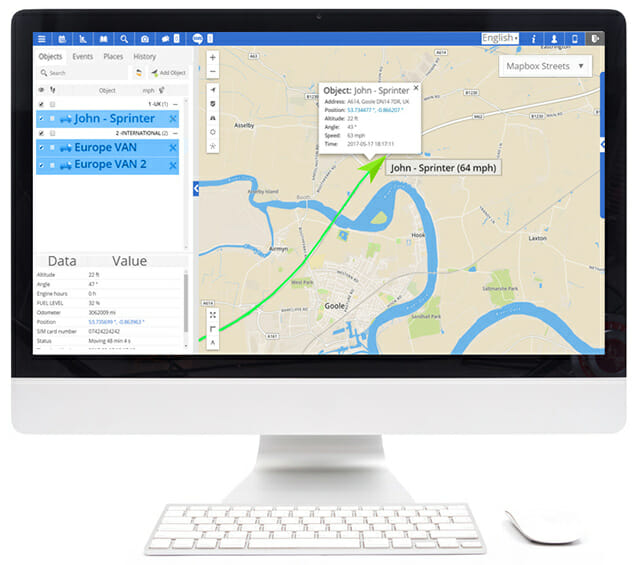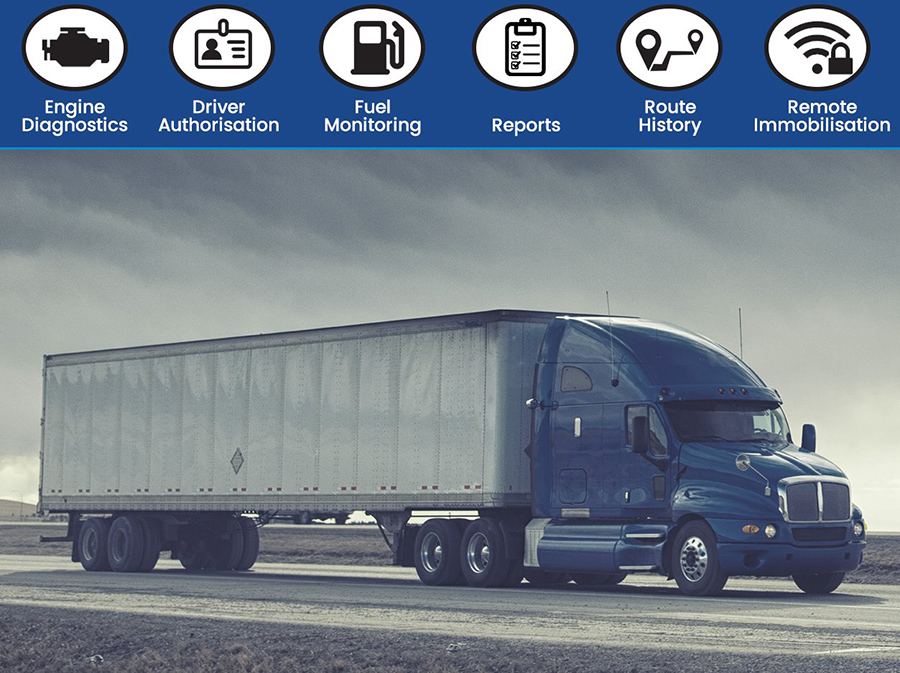No matter the size or the industry, fleet management systems can make a significant impact on your business. Driver and vehicle expenses are among the highest costs for companies and GPS tracking software can help reduce them. If you want to cut down on operational costs and improve the efficiency of your fleet, investing in a fleet management system is a must. By installing a fleet tracking system managers are able to take all aspects of their fleet into their hands. Fleet management systems generate a return on investment in only 6 months and they provide a means for optimizing fleet drivers’ behaviour and generating ROI beyond fuel savings.

The case study by the U.S. Department of Energy shows how much businesses can save by incorporating a fleet management system into their infrastructure:
- Fuel & Maintenance – The average operating cost per vehicle is about $1.50 per mile. A company can reduce at least 25 miles per week for each vehicle with a small fleet vehicle tracking device.
- Employee Overtime – The employee overtime rate is estimated at about $30 per hour. On average, a company can reduce at least 1 hour of overtime per week with a small fleet vehicle tracking device.
- Employee Productivity – On average, each vehicle could complete at least 1 extra stop, job, or delivery per week with a live GPS fleet tracking unit.
For a medium-sized fleet of 20 vehicles, Fleet Management Systems generate an estimated monthly savings of over $6,000.

Fleet Maintenance and Management Facts:
- The wear and tear on your tires will almost double at road speeds over 70 MPH.
- Every 5 mph you drive over 60 mph makes your waste 10% more in fuel.
- At 70 MPH, stopping distance is 60% greater than at 50 MPH. Even during daytime, higher velocity increases the probability of an accident significantly.
- Increasing the average travelling speed from 60 MPH to 70 MPH increases the maintenance cost by over 75%.
Fleet management systems help businesses to maintain and monitor their vehicles with ease reducing costs in the process. Purchasing and maintaining the fleet tracking systems may have an initial cost but they more than make up for it with the sophisticated management tools you gain in return. Let’s have a look at some of the benefits of fleet management systems;
– Efficient Route Planning
For decades, fleet managers and drivers had very limited communication with each other making it hard to plan shorter and more efficient routes. With the introduction of fleet management systems and real-time location tracking, managing an entire fleet and rerouting the vehicles on the roads only takes a few minutes. With all relevant information on the screen and multiple ways to communicate, navigating drivers through the traffic has never been easier.
– Driver Behaviour Management
Reckless driving habits can lead to devastating consequences. Sometimes your drivers can feel under pressure to make the next delivery on time and ignore the rules in place. Such unwanted behaviour can damage your company reputation, endanger the very lives of the drivers and people around them. That is why it is important to eliminate these habits and encourage safer driving methods. Fleet management software can be configured to send notifications for vehicles that are over the speed limit or harsh braking and prevent a possible accident beforehand.

– Fuel Management
The largest expense in a fleet’s budget, especially in a fleet of trucks, is fuel. One of the greatest benefits of fleet management software is detailed fuel consumption reports. By analyzing these reports, you can identify the sources of fuel waste and put a stop to them. To reduce fuel costs, you need to plan shorter routes to minimize mileage and monitor route execution by the drivers to make sure that they are following the assigned route. Getting rid of unwanted driver behaviour such as speeding and idling is another way to reduce fuel waste. You can control all aspects of fuel consumption by utilizing fleet management systems and save massive amounts of fuel and money in the long run.
– Less time on Paperwork
Having a lot of vehicles, drivers and employees mean paperwork, a lot of paperwork. For any member of the management involved, it is a tedious and tiring process to manually keep track of shifts, maintenance schedules, insurance records and whatnot. But GPS systems will help the managers, dispatchers and drivers get rid of most of the mundane tasks and allow you to generate reports that can be examined on mobile devices or a computer. A fleet management system drastically lowers the amount of paperwork around the office and saves precious time at the same time.

– Improved Safety and Breakdown Recovery
Fleet management systems can be used as a method to protect your employees as well as your business. The ability to track the location of a vehicle in real-time has obvious safety benefits. In the event of an accident, the exact location of the incident can be pinpointed in a matter of seconds and medical aid can be directed to the location. Time is of the essence in such situations and a fast response can help save lives. Another major problem with having a fleet is vehicle breakdowns. A truck can be stranded in a remote location and in unsavoury weather conditions. The driver and the vehicle can be found quickly by tracking their location and road assistance can be sent to fix the broken vehicle. From a business standpoint, the fleet vehicles will be found and repaired more quickly which means less money wasted due to downtime.
– Customer Satisfaction
Dispatchers and field supervisors have to respond to client calls and job requests quickly to prevent having issues with customers. Without knowing where vehicles and service agents are, it is next to impossible to identify which employee to send. However, thanks to fleet management software, you have the ability to locate any vehicle and dispatch the closest person to the job site or the customer. Fleet management systems can be used to deliver detailed information to customers such as precise ETAs as well. By using any mobile device or a computer, you can access all the relevant data about delivery or a job site and inform your customers. On-time deliveries and flawless task completions will boost your customer satisfaction which will reflect in revenue.
– Maintenance Scheduling
Normally fleet vehicles are scheduled for maintenance at regular intervals. This method has been used by all fleets because they didn’t have a definitive way of knowing which vehicle needs repair. Fleet tracking software receives and stores all the error codes sent by the vehicle engine. You can monitor key aspects such as vehicle diagnostics, engine temperature, and fuel level indicators to determine which vehicle needs repair and when. There will be no need for routine inspections and by scheduling preventive maintenance for your vehicles, you make sure they stay in the best working condition. Not only you will save money on vehicle downtime, but well-maintained vehicles are also less likely to break down on the road.
In today’s competitive business world, businesses need an edge to beat their competitors. Even more so if you are operating a large vehicle fleet. To succeed, businesses must take advantage of the technological advancements and invest in a fleet management system to battle all the potential problems they will face down the road.


